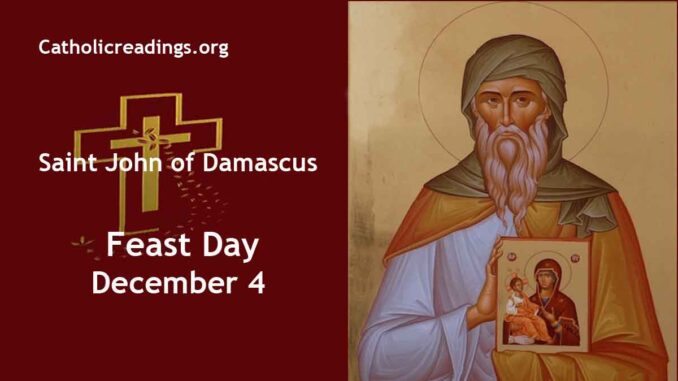St John of Damascus was also known as Jean Damascene or Yūḥana ibn Manṣūr ibn Sarjūn.
He was an Arab Christian monk, priest, hymnographer, and apologist.
He was born on 675 AD in Damascus, Syria, and died in 749 AD in Mar Saba, near Jerusalem.
We celebrate his feast day on December 4 every year in the Catholic Church.
| St John of Damascus Biography | |
|---|---|
 |
|
| Date of Birth | 675 AD |
| Place of Birth | Damascus, Syria |
| Profession | Monk and priest |
| Date of Death | 749 AD |
| Place of Death | Mar Saba, near Jerusalem |
| Feast Day | December 4 |
| Canonization | Pre-congregation |
| Patron Saint of |
|
St John of Damascus’s Life History
St. John of Damascus, also known as Jean Damascene or Yūḥana ibn Manṣūr ibn Sarjūn, was an Arab Christian monk, priest, hymnographer, and defender of the faith.
He was born in 675 AD in Damascus, Syria, to Mansur, who represented the Christians at the court of the Muslim caliph.
Surprisingly, he flourished as a Christian in a predominantly Muslim environment. John of Damascus followed in his father’s footsteps and served as one of the Muslim caliph Abdul Malek’s tax officials.
During his youth, he received education from a captured Italian monk named Cosmas, which, combined with his exposure to Muslim teachings, provided him with a comprehensive classical education covering subjects like geometry, literature, logic, and rhetoric.
John actively championed the use of icons and images in churches and wrote a series of letters opposing the anti-icon decrees of Germanus, Patriarch of Constantinople.
According to legend, Germanus conspired against him and fabricated a letter in which John appeared to betray the caliph.
As a result, the caliph ordered John’s writing hand to be severed. However, the Virgin Mary is said to have miraculously reattached the hand, leading to the restoration of the caliph’s faith in him.
Following this life-altering event around 730 AD, John chose to become a monk in Mar Saba near Jerusalem and subsequently became a priest dedicating the rest of his life to study, writing, and preaching.
He composed three Discourses on Sacred Images around 730 AD, defending the veneration of icons against the opposition of the Byzantine emperor Leo III and the Iconoclasts.
The Iconoclasts managed to obtain a condemnation of John at the Council of Hieria in 754 AD, which was later reversed at the Second Council of Nicaea in 787 AD.
John of Damascus authored “The Fountain of Wisdom,” recognized as the first comprehensive compendium of Christian theology, along with various other works defending orthodox beliefs, commentaries on St Paul the Apostle, poetry, and hymns.
His exceptional oratory skills earned him the title “the Golden Orator” (Greek: Chrysorrhoas, literally “the Golden Stream”).
Among his approximately 150 written works, “Pēgē gnōseōs” (“The Source of Knowledge”) stands out as a synthesis of Christian philosophy and doctrine.
It played a pivotal role in shaping medieval Latin thought and served as the primary textbook of Greek Orthodox theology.
John is regarded as the last of the Greek Fathers of the Church and the first of the Christian Aristotelians. He also adapted choral music for liturgical use and was proclaimed a Doctor of the Church in 1890 by Pope Leo XIII.
St. John of Damascus died in 749 AD at Mar Saba, near Jerusalem. He is the patron saint of pharmacists, icon painters, and theology students. In art depictions, he is often shown with his severed hand and a Marian icon.
His literary works include “Barlaam and Ioasaph,” “Collected Works,” “Exact Exposition Of The Orthodox Faith,” “Exposition of the Orthodox Faith,” and “Sermon 1 on the Assumption.”
Related Links
Powered By SEO Experts
Follow @ReadingCatholic
